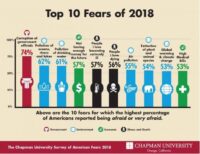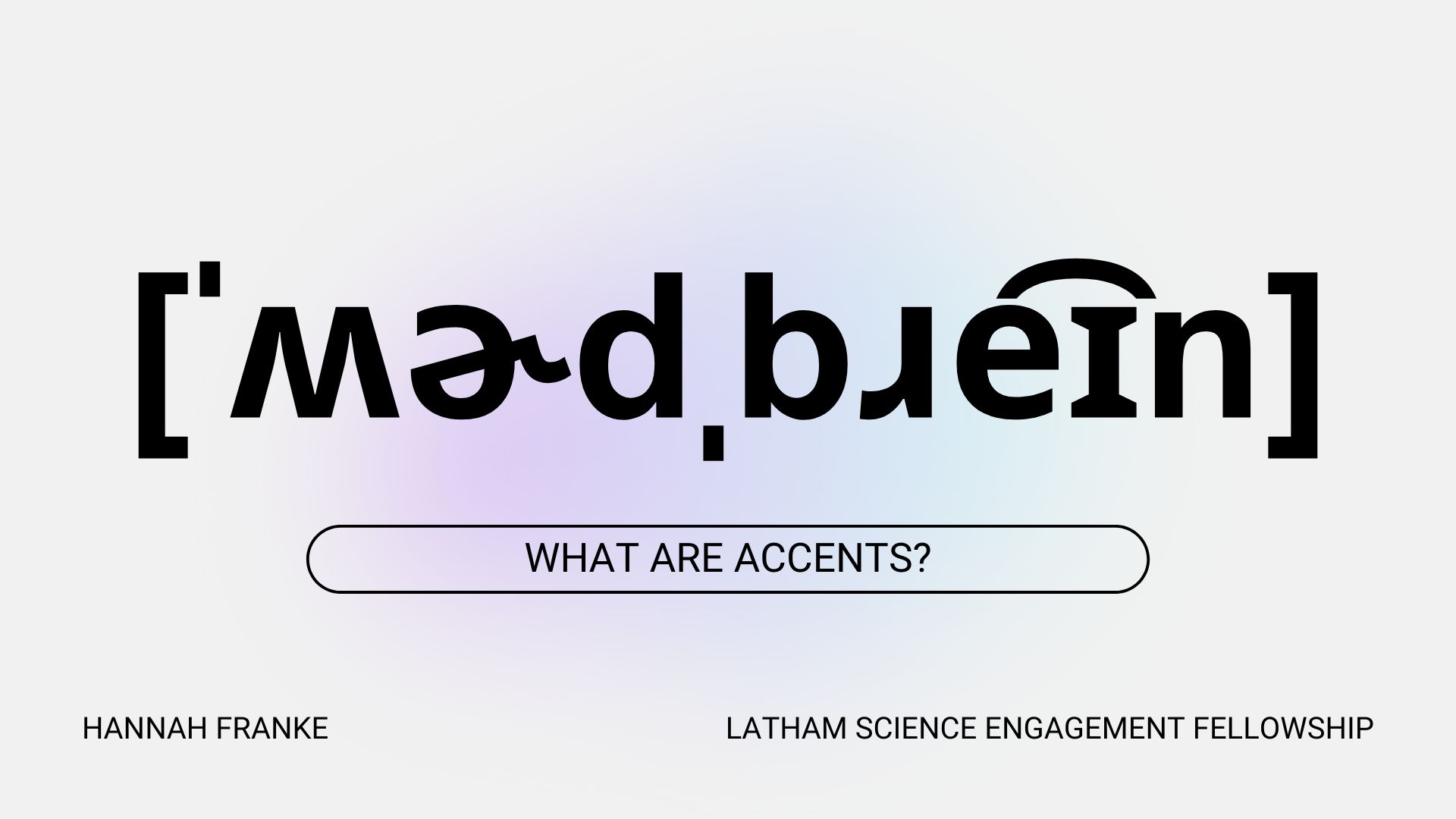by Hannah Back
The Rise of Climate Pessimism
Attitudes about climate change have been changing in recent years. Climate change is now a “top fear” in Americans1.

Chapman University’s “Top Fears of 2018” show global warming and species extinctions in the top 10 fear list among surveyed individuals.
Younger generations are more likely to say climate issues should be a “top priority”. About 3/4ths of concerned Americans feel “anxious about the future” when they see climate change related content 2. Globally, more than half of young people think “humanity is doomed”, and 75% said the future is frightening 3.
Climate change is occurring, and poses a great threat to humanity– But does this mean “humanity is doomed”? Do scientists have any ideas on how to grapple with the crisis? How do they frame the situation?
I am passionate about climate science and environmentalism, and I view climate change as the biggest threat we must face in the 21st century. I often deal with climate pessimism myself. To learn more about my own (and our generation’s) fears, I decided to look to the scientific literature. I did a literature review on “attitudes about climate change” and what scientists could recommend, and here is what I learned.
There is debate about “how anxious we should be”. Perhaps we should be anxious, but just need ways to deal with it and use it as a motivating force 8. Others wonder if being too anxious or fearful may paralyze us from taking action 4. There is still much debate in this area.

How anxious should we be?10
Causes of Climate Anxiety
To understand climate anxiety better, we should delve into the different contributing factors. Like Covid-19, there are many reasons to be anxious about this threatening force of nature. However, fears come from different places, and some may be more based in facts than others.
Personal Experience
Many people have noticed weather changes in recent years, with patterns becoming more unpredictable: Heat waves in the UK have become more common, forest fires in the US, more severe hurricanes with a longer season, and more.
For those living through these disasters, there is a serious impact on mental health. These events can also indirectly affect people through media exposure alone, contributing to a sense of anxiety and unease6.
The Influence of Social Media
Social media and news websites tend to post more negative headlines because these generate more clicks. Algorithms push content that gets the most interaction—this tends to be content that fans the flames of conflict (negative, divisive, or inflammatory content)7.

Images like this used on social media or in the news may induce anxiety.
Overexposure to media coverage, which informs through an emotional lens, as opposed to scientific sources, might add to fears. Exposure to climate change related social media content may induce anxiety symptoms3.
Scientists’ Language
Scientists are more vocal than ever about the growing climate crisis, using strong language like “rapid”, “catastrophic”, “irreversible”4. They are sounding the alarm, and it is natural and appropriate to feel concerned.
Climate change is real, rapid, irreversible—These descriptions, while correct, leave us with a lot of anxiety, but not many details. Knowing “how rapid is rapid”, or “catastrophic in what ways” could help us have a more concrete understanding of the crisis. Better understanding might also motivate us towards positive action.
Beyond Fear
If the view “climate change will doom us all” is perhaps too negative, is there an alternative? Some scientists propose a different perspective. While the crisis is alarming, we should avoid “alarmism”. They suggest one way of framing the crisis that may help us grapple with our fears: “Climate change is alarming if action is not taken soon”4.
This viewpoint balances the facts that:
- Climate change is a gravely serious problem to be addressed, and
- There is still time to make changes that can avert the worst.
Avoiding the worst of climate change’s effects will require a restructuring of how we generate and use energy, but those things are within our control9. Therefore,
“Climate change is within our control and not inevitable, but changes must be comprehensive” 4
This perspective is also in line with the Intergovernmental Panel on Climate Change (IPCC), an international agency of top climate scientists9. If we focus on the things within our control, we may also feel more empowered to action.

Figure 4) Changes still have impact and can help avert the crisis.
We need to sound the alarm on climate change and make big changes. Understanding that there is still time to make changes can help us stay motivated. It is still possible to avert the worst outcomes, so we should still be engaged in the struggle towards environmental justice in whatever ways we can be. In the next post, I will discuss some ways you can be involved in the solution!
References
[1] C. Funk, Key findings: How Americans’ attitudes about climate change differ by generation, party and other factors, Pew Research Center (2021). https://www.pewresearch.org/short-reads/2021/05/26/key-findings-how-americans-attitudes-about-climate-change-differ-by-generation-party-and-other-factors/ (accessed April 25, 2024).
[2] C. Hickman, E. Marks, P. Pihkala, S. Clayton, R.E. Lewandowski, E.E. Mayall, B. Wray, C. Mellor, L. Van Susteren, Climate anxiety in children and young people and their beliefs about government responses to climate change: a global survey, The Lancet Planetary Health 5 (2021) e863–e873. https://doi.org/10.1016/S2542-5196(21)00278-3.
[3] D.A. Maran, T. Begotti, Media Exposure to Climate Change, Anxiety, and Efficacy Beliefs in a Sample of Italian University Students, IJERPH 18 (2021) 9358. https://doi.org/10.3390/ijerph18179358.
[4] G. Albrecht, Chronic Environmental Change: Emerging ‘Psychoterratic’ Syndromes, in: I. Weissbecker (Ed.), Climate Change and Human Well-Being, Springer New York, New York, NY, 2011: pp. 43–56. https://doi.org/10.1007/978-1-4419-9742-5_3.
[5] The Chapman University Survey on American Fears, (n.d.). https://www.chapman.edu/wilkinson/research-centers/babbie-center/survey-american-fears.aspx (accessed April 25, 2024).
[6] J.S. Risbey, The new climate discourse: Alarmist or alarming?, Global Environmental Change 18 (2008) 26–37. https://doi.org/10.1016/j.gloenvcha.2007.06.003.
[7] W.J. Brady, J.C. Jackson, B. Lindström, M.J. Crockett, Algorithm-mediated social learning in online social networks, Trends in Cognitive Sciences 27 (2023) 947–960. https://doi.org/10.1016/j.tics.2023.06.008.
[8] J. Dodds, The psychology of climate anxiety, BJPsych Bull 45 (n.d.) 222–226. https://doi.org/10.1192/bjb.2021.18.
[9] IPCC, 2018: Global warming of 1.5°C. An IPCC Special Report on the impacts of global warming of 1.5°C above pre-industrial levels and related global greenhouse gas emission pathways, in the context of strengthening the global response to the threat of climate change, sustainable development, and efforts to eradicate poverty [V. Masson-Delmotte, P. Zhai, H. O. Pörtner, D. Roberts, J. Skea, P.R. Shukla, A. Pirani, W. Moufouma-Okia, C. Péan, R. Pidcock, S. Connors, J. B. R. Matthews, Y. Chen, X. Zhou, M. I. Gomis, E. Lonnoy, T. Maycock, M. Tignor, T. Waterfield (eds.)]. In Press.
[10] Rational vs. Irrational Fears? How to Tell the Difference, FHE Health (2023). https://fherehab.com/learning/rational-irrational-fears.


